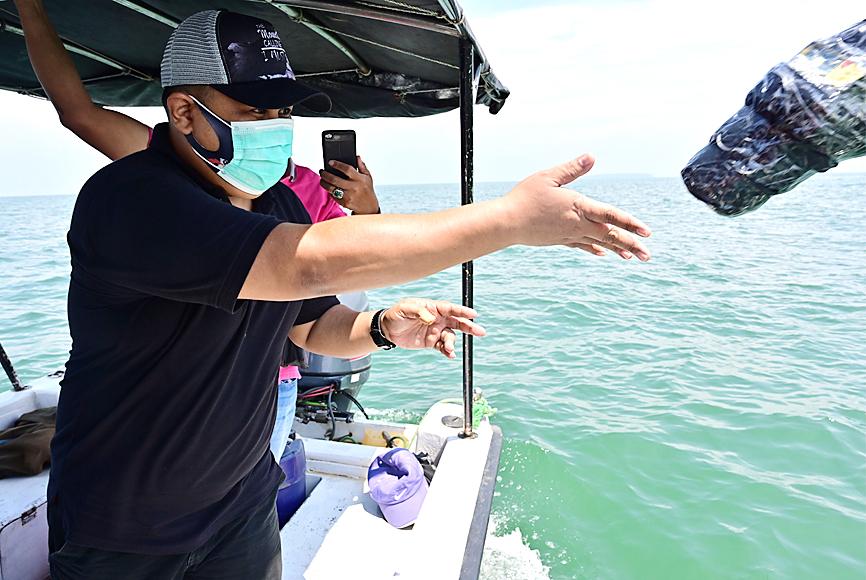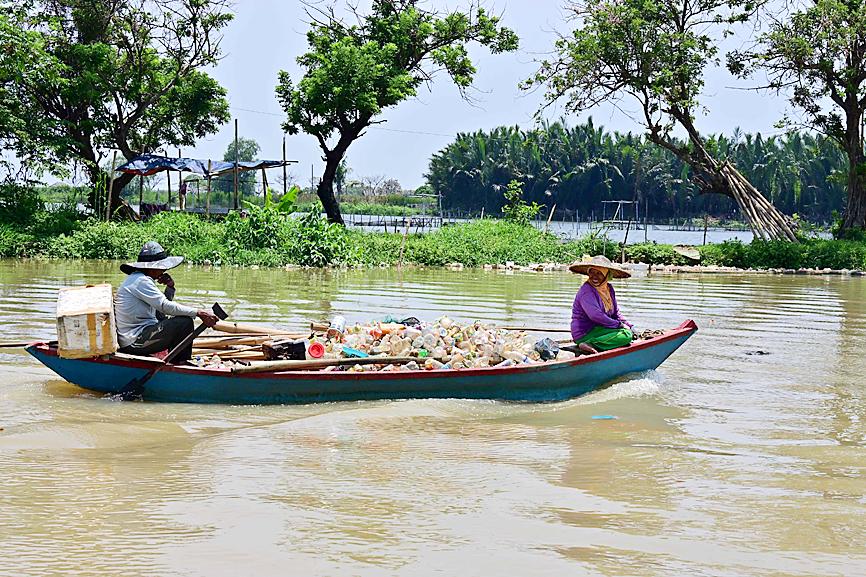Every year, pounding rains wash away mountains of plastic waste from the streets of Jakarta, with some of it ending up as far away as Bali’s beaches, so scientists are turning to satellites to trace the rubbish and figure out how to tackle the problem.
Indonesia allows more waste to enter the ocean than any other country, apart from China.
The archipelago of nearly 270 million people dumps a whopping 620,000 tonnes of plastic into its waterways annually, a figure that the government said it wants to cut by two-thirds over the next five years.

Photo: AFP
Scientists hope that following the waste’s movement would help them understand the full extent of the problem and decide how best to collect it based on seasonal, wind and water current patterns.
The World Bank-backed project is a collaboration between a team from the Indonesian Ministry of Maritime Affairs and CLS Argos, a subsidiary of France’s space agency.
The project is an indication of the issue’s global importance — today, an estimated 150 million tonnes of plastic are circulating in the world’s oceans, with more being dumped every minute, the US-based Ocean Conservancy said.

Photo: AFP
Since February, the team has deployed satellite beacons at the mouths of rivers around Jakarta, Bandung in Central Java and Palembang on the island of Sumatra.
“Today, we’re launching GPS beacons to learn how the plastic debris gets into the sea,” said CLS Argos technician Ery Ragaputra, as he tossed a yellow device wrapped in a waterproof cover into the Cisadane River, which empties into the Java Sea near Jakarta.
“These trackers will follow where the trash gathers and where it lands,” he added.
Data collected by the beacons, which have a one-year battery life, are transmitted hourly to a satellite that pings the information to CLS Argos headquarters in France, and then back to screens at the maritime affairs ministry.
Initial figures are promising, researchers said.
“Ninety percent of the beacons we have released are beaching after a few hours or a few days, which is relatively good news, as it makes it easier for the Indonesian authorities to collect [the rubbish],” said Jean-Baptiste Voisin, director of CLS Argos’ local subsidiary.
“[But] some waste released six months ago is still drifting, so the debris is still in the ocean,” he added.
Among the beacons launched near Jakarta, some have traveled 1,100km east to Bali, while others from Indonesia’s second-biggest city, Surabaya, have floated all the way to fragile mangroves in westernmost Sumatra.
The goal is to release up to 70 beacons by the end of next year.
Cleaning up Indonesia’s waters is an immense challenge and these efforts might take years to bear fruit.
While the capital Jakarta has banned single-use plastics, public awareness remains low and waste recycling is only in its infancy.
The vast city’s rivers are a waste-choked eyesore.
Authorities hope that by identifying plastic drift and how it accumulates, they can collect it more efficiently — for example by deploying boats to key rubbish sites or equipping the locations with waste-collecting traps.
They think that it also means that they can better anticipate its effects on the environment.

DOUBLE-MURDER CASE: The officer told the dispatcher he would check the locations of the callers, but instead headed to a pizzeria, remaining there for about an hour A New Jersey officer has been charged with misconduct after prosecutors said he did not quickly respond to and properly investigate reports of a shooting that turned out to be a double murder, instead allegedly stopping at an ATM and pizzeria. Franklin Township Police Sergeant Kevin Bollaro was the on-duty officer on the evening of Aug. 1, when police received 911 calls reporting gunshots and screaming in Pittstown, about 96km from Manhattan in central New Jersey, Hunterdon County Prosecutor Renee Robeson’s office said. However, rather than responding immediately, prosecutors said GPS data and surveillance video showed Bollaro drove about 3km

Tens of thousands of people on Saturday took to the streets of Spain’s eastern city of Valencia to mark the first anniversary of floods that killed 229 people and to denounce the handling of the disaster. Demonstrators, many carrying photos of the victims, called on regional government head Carlos Mazon to resign over what they said was the slow response to one of Europe’s deadliest natural disasters in decades. “People are still really angry,” said Rosa Cerros, a 42-year-old government worker who took part with her husband and two young daughters. “Why weren’t people evacuated? Its incomprehensible,” she said. Mazon’s

‘MOTHER’ OF THAILAND: In her glamorous heyday in the 1960s, former Thai queen Sirikit mingled with US presidents and superstars such as Elvis Presley The year-long funeral ceremony of former Thai queen Sirikit started yesterday, with grieving royalists set to salute the procession bringing her body to lie in state at Bangkok’s Grand Palace. Members of the royal family are venerated in Thailand, treated by many as semi-divine figures, and lavished with glowing media coverage and gold-adorned portraits hanging in public spaces and private homes nationwide. Sirikit, the mother of Thai King Vajiralongkorn and widow of the nation’s longest-reigning monarch, died late on Friday at the age of 93. Black-and-white tributes to the royal matriarch are being beamed onto towering digital advertizing billboards, on

POWER ABUSE WORRY: Some people warned that the broad language of the treaty could lead to overreach by authorities and enable the repression of government critics Countries signed their first UN treaty targeting cybercrime in Hanoi yesterday, despite opposition from an unlikely band of tech companies and rights groups warning of expanded state surveillance. The new global legal framework aims to bolster international cooperation to fight digital crimes, from child pornography to transnational cyberscams and money laundering. More than 60 countries signed the declaration, which means it would go into force once ratified by those states. UN Secretary-General Antonio Guterres described the signing as an “important milestone,” and that it was “only the beginning.” “Every day, sophisticated scams destroy families, steal migrants and drain billions of dollars from our economy...